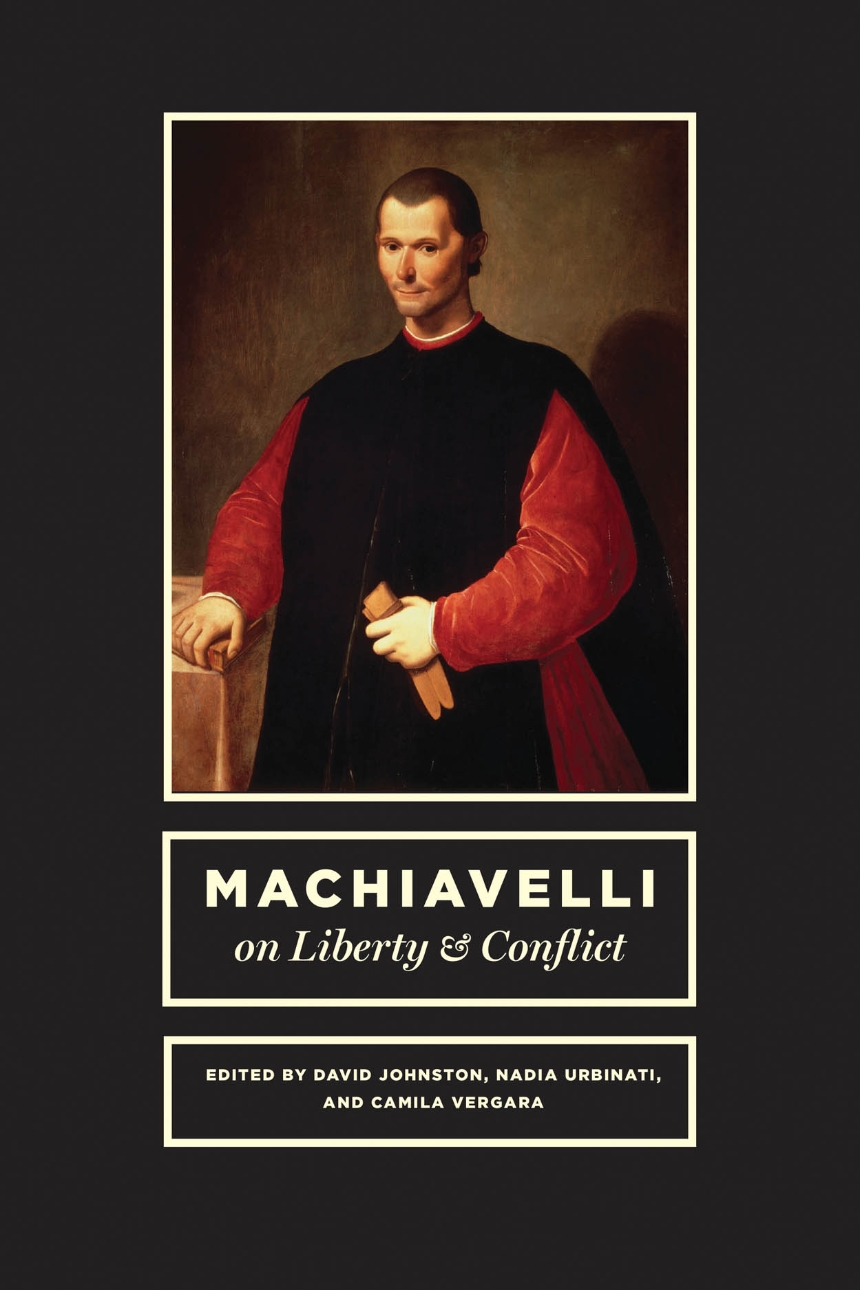Machiavelli on Liberty and Conflict
More than five hundred years after Machiavelli wrote The Prince, his landmark treatise on the pragmatic application of power remains a pivot point for debates on political thought. While scholars continue to investigate interpretations of The Prince in different contexts throughout history, from the Renaissance to the Risorgimento and Italian unification, other fruitful lines of research explore how Machiavelli’s ideas about power and leadership can further our understanding of contemporary political circumstances.
With Machiavelli on Liberty and Conflict, David Johnston, Nadia Urbinati, and Camila Vergara have brought together the most recent research on The Prince, with contributions from many of the leading scholars of Machiavelli, including Quentin Skinner, Harvey Mansfield, Erica Benner, John McCormick, and Giovanni Giorgini. Organized into four sections, the book focuses first on Machiavelli’s place in the history of political thought: Is he the last of the ancients or the creator of a new, distinctly modern conception of politics? And what might the answer to this question reveal about the impact of these disparate traditions on the founding of modern political philosophy? The second section contrasts current understandings of Machiavelli’s view of virtues in The Prince. The relationship between political leaders, popular power, and liberty is another perennial problem in studies of Machiavelli, and the third section develops several claims about that relationship. Finally, the fourth section explores the legacy of Machiavelli within the republican tradition of political thought and his relevance to enduring political issues.
With Machiavelli on Liberty and Conflict, David Johnston, Nadia Urbinati, and Camila Vergara have brought together the most recent research on The Prince, with contributions from many of the leading scholars of Machiavelli, including Quentin Skinner, Harvey Mansfield, Erica Benner, John McCormick, and Giovanni Giorgini. Organized into four sections, the book focuses first on Machiavelli’s place in the history of political thought: Is he the last of the ancients or the creator of a new, distinctly modern conception of politics? And what might the answer to this question reveal about the impact of these disparate traditions on the founding of modern political philosophy? The second section contrasts current understandings of Machiavelli’s view of virtues in The Prince. The relationship between political leaders, popular power, and liberty is another perennial problem in studies of Machiavelli, and the third section develops several claims about that relationship. Finally, the fourth section explores the legacy of Machiavelli within the republican tradition of political thought and his relevance to enduring political issues.
440 pages | 6 x 9 | © 2017
Philosophy: Aesthetics, General Philosophy
Political Science: Political and Social Theory
Reviews
Table of Contents
Introduction
1. Machiavelli on Necessity
5. Machiavelli and the Misunderstanding of Princely Virtù
9. Machiavelli and the Gracchi: Republican Liberty and Class Conflict
12. The Reception of Machiavelli in Contemporary Republicanism: Some Ambiguities and Paradoxes
Index
David C. Johnston, Nadia Urbinati, and Camila Vergara
Part One: Between Antiquity and Modernity1. Machiavelli on Necessity
Harvey C. Mansfield
2. Machiavelli on Good and Evil: The Problem of Dirty Hands RevisitedGiovanni Giorgini
3. Machiavelli and the Critics of Rome: Rereading Discourses I.4Gabriele Pedullà
4. Machiavelli, “Ancient Theology,” and the Problem of Civil ReligionMiguel Vatter
Part Two: The Prince and the Politics of Necessity5. Machiavelli and the Misunderstanding of Princely Virtù
Quentin Skinner
6. The Necessity to Be Not-Good: Machiavelli’s Two RealismsErica Benner
7. Loyalty in AdversityStephen Holmes
8. Machiavelli and the Modern Tyrant Paul A. Rahe
Part Three: Class Struggle, Financial Power, and Extraordinary Authority in the Republic9. Machiavelli and the Gracchi: Republican Liberty and Class Conflict
Benedetto Fontana
10. Machiavelli, the Republic, and the Financial CrisisJérémie Barthas
11. Extraordinary Accidents in the Life of Republics: Machiavelli and Dictatorial AuthorityMarco Geuna
Part Four: Machiavellian Politics beyond Machiavelli12. The Reception of Machiavelli in Contemporary Republicanism: Some Ambiguities and Paradoxes
Jean-Fabien Spitz
13. On the Myth of the Conservative Turn in Machiavelli’s Florentine HistoriesJohn P. McCormick
14. Political Imagination, Conflict, and Democracy: Machiavelli’s Republican RealismLuca Baccelli
15. “Armi proprie e improprie” in the Work of Some Representative Italian Readers of the Twentieth CenturyMichele Battini
16. What Does a “Conjuncture-Embedded” Reflection Mean? The Legacy of Althusser’s Machiavelli to Contemporary Political TheoryMarie Gaille
ContributorsIndex
